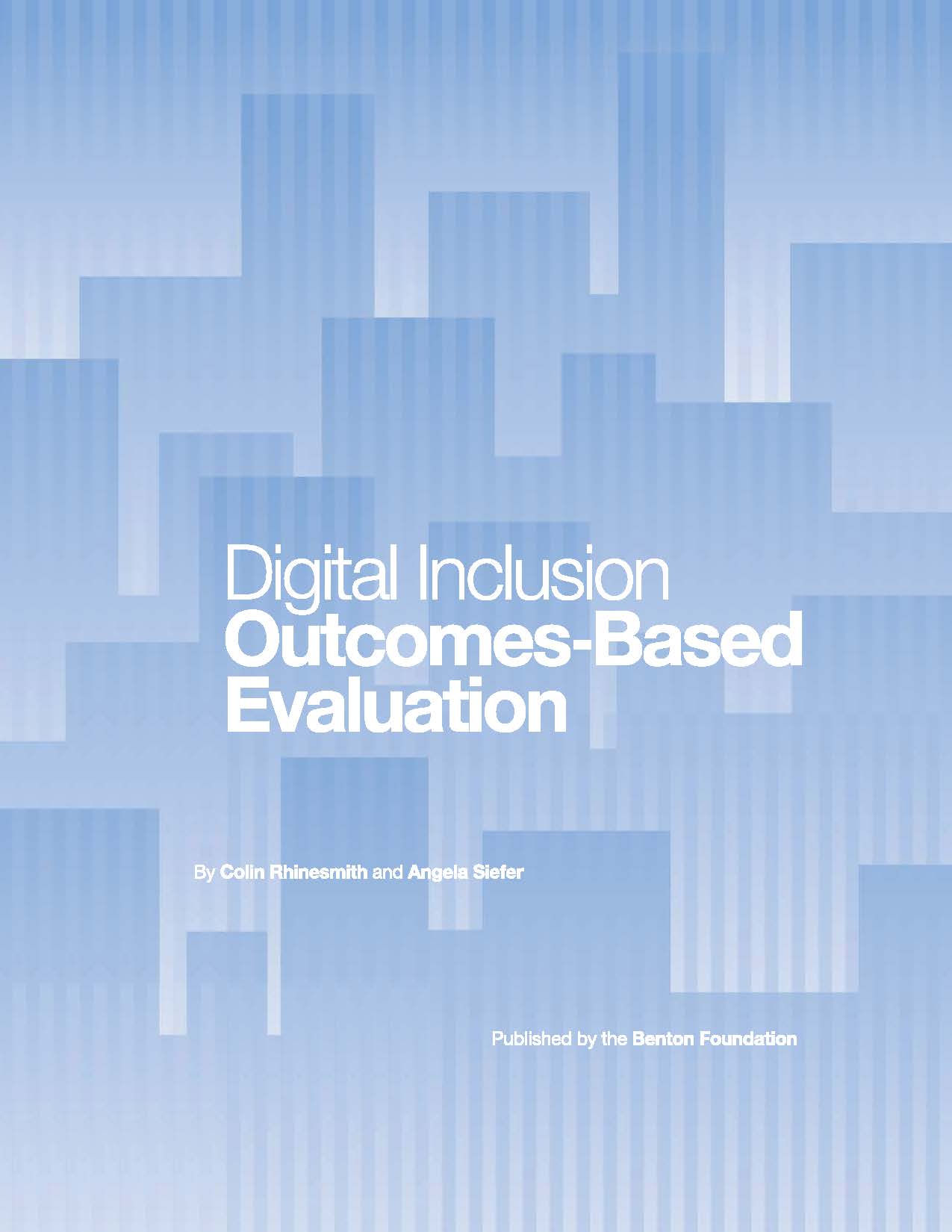Colin Rhinesmith
Digital Inclusion and Outcomes-Based Evaluation
In recent years, government agencies, private foundations, and community-based organizations have increasingly sought to understand how programs that promote digital inclusion lead to social and economic outcomes for individuals, programs, and communities. This push to measure outcomes has been driven, in part, by a larger trend to ensure that dollars are being used efficiently to improve lives rather than simply to deliver services. A new report, published by Benton Foundation, describes the challenges facing community-based organizations and other key stakeholders in using outcomes-based evaluation to measure the success of their digital inclusion programs and offers recommendations toward addressing these shared barriers. This new research builds off Dr. Colin Rhinesmith’s Digital Inclusion and Meaningful Broadband Adoption Initiatives, released in early 2016. That report identified the core offerings of digital inclusion organizations – from providing low-cost broadband, and the devices to connect to it, while helping new broadband adopters gain the skills they need to navigate the Internet and online services. In this national study of digital inclusion organizations, Dr. Rhinesmith also noted that most of the digital inclusion organizations that participated in this study did not have outcomes-based evaluation frameworks. However, all recognized the importance of having them. This finding led us to conduct this deeper research on the challenges surrounding outcomes-based evaluation. Twenty-some years ago community technology centers offered training and public access to computers (a few with Internet access). Today we have digital inclusion programs provided by community-based organizations, libraries, and local government. The purpose twenty years ago was not the technology but what one could do with it. The same is true today. The difference is that we are now trying to clearly define the outcomes of access and use of the technology. What we do with the technology and the outcomes will continue to evolve as the technology evolves.
At the Edges of the National Digital Platform
Libraries straddle the information needs of the 21st century. The wifi, computers and now mobile hotspots that some libraries provide their patrons are gateways to a broad, important, and sometimes essential information resources. The research summarized here examines how rural libraries negotiate telecommunications environments, and how mobile hotspots might extend libraries' digital significance in marginalized and often resource-poor regions.
The Internet has grown tremendously in terms of its centrality to information and entertainment resources of all sorts, but the ability to access the Internet in rural areas typically lags that experienced in urban areas. Not only are networks less available in rural areas, they also often are of lower quality and somewhat more expensive; even mobile phone-based data plans — assuming there are acceptable signals available — may be economically out of reach for people in these areas. With older, lower income and less digitally skilled populations typically living in rural areas, the role of the library and its freely available resources may be especially useful. This research examines libraries' experiences with providing free, mobile hotspot-based access to the Internet in rural areas of Maine and Kansas.
This report describes the challenges facing community-based organizations and other key stakeholders in using outcomes-based evaluation to measure the success of their digital inclusion programs and offers recommendations toward addressing these shared barriers.

Digital Equity Planning in US Cities
The Federal Communications Commission has recently tasked its Consumer and Governmental Affairs Bureau with the development of a plan to identify and work to address non-price related barriers to digital inclusion. Here, we share strategies that local/regional governments can implement in their digital equity planning process. We are currently investigating the digital equity planning processes in Austin (TX), Portland (OR), and Seattle (WA) -- three US cities with their own established stand-alone plans. We have interviewed local government officials and other key stakeholders as well as reviewed city-level policy and planning documents. Based on our preliminary examination of the digital equity plans and through our own interviews with local policymakers, we offer these recommendations:
Local governments should employ a central planning and coordination office with legitimate authority to facilitate digital equity planning.
Local planners should ensure that traditionally-excluded groups are included in digital equity planning.
Local decision-makers should use research from a variety of sources to inform digital equity planning.
We offer these preliminary findings and recommendations as key insights to assist local, state, and federal policymakers in creating effective digital equity plans.
[Dr Brandon Brooks is an Assistant Professor of Digital Media Studies in the James L. Knight School of Communication at Queens University of Charlotte. Dr Colin Rhinesmith conducts original Benton research and is an assistant professor in the School of Library and Information Science at Simmons College and a faculty associate with the Berkman Klein Center for Internet & Society at Harvard University. Angela Siefer is the Director of the National Digital Inclusion Alliance (NDIA).]
With library systems increasingly prioritizing equitable access to the Internet and digital literacy training, the role 21st-century libraries serve in promoting digital inclusion has become more prominent.
This report presents findings from a national study of digital inclusion organizations that help low-income individuals and families adopt high-speed Internet service. The study looked at eight digital inclusion organizations across the United States that are working at the important intersection between making high-speed Internet available and strengthening digital skills—two essential and interrelated components of digital inclusion, which is focused on increasing digital access, skills, and relevant content.


